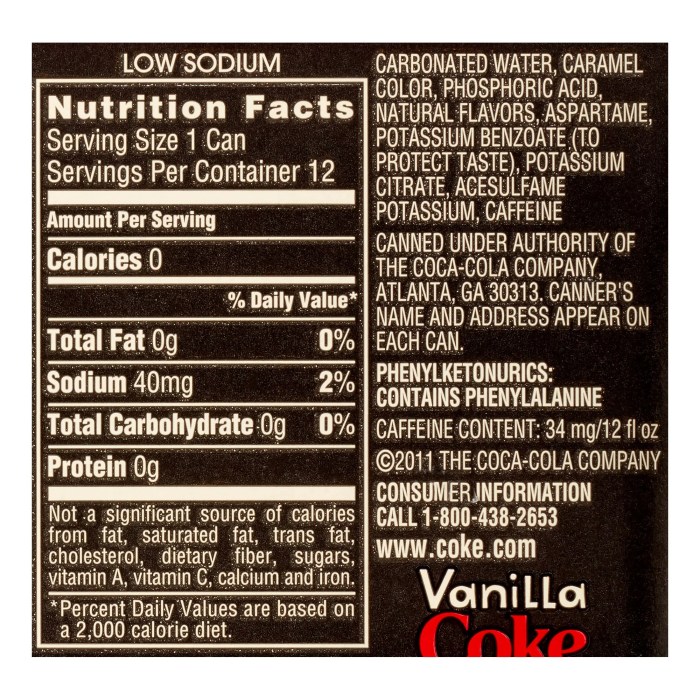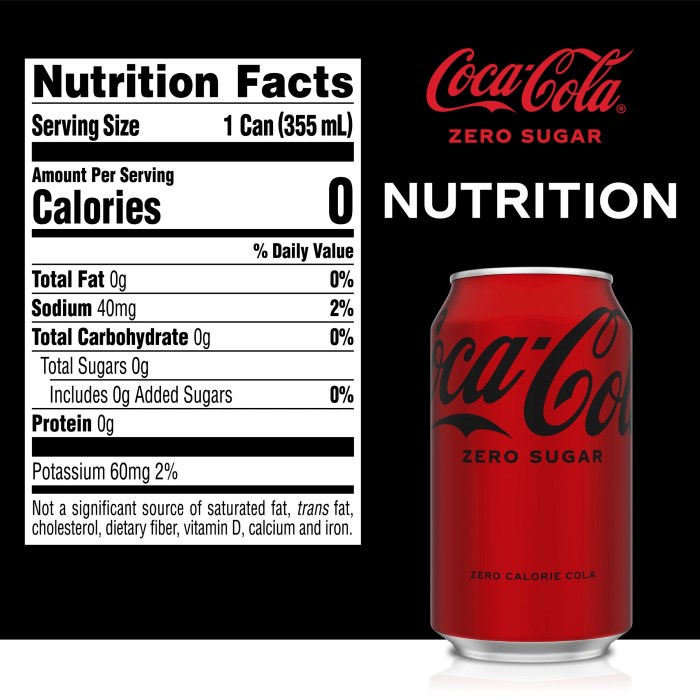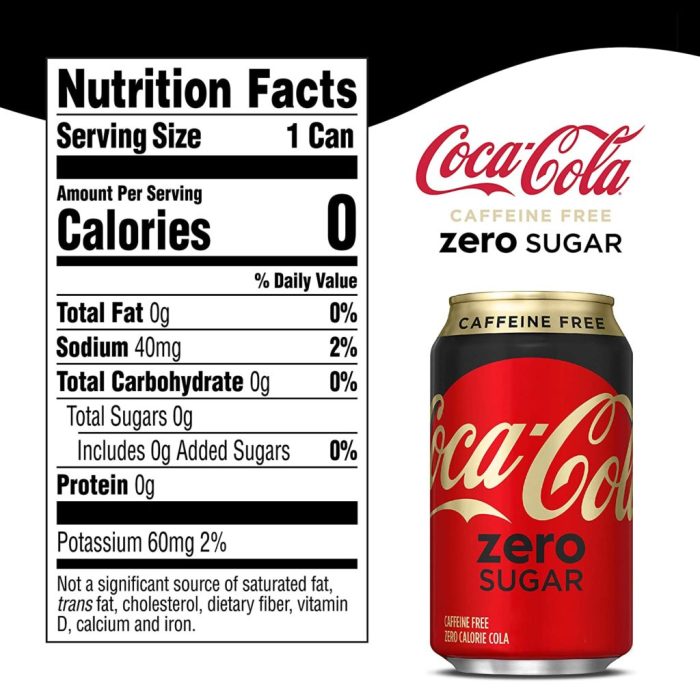Coke Zero Ingredients and Their Roles

Can coke zero nutrition facts – Coke Zero, like its sugary counterpart, is a complex concoction of ingredients designed to deliver that familiar Coca-Cola taste without the calories. Understanding these components and their potential effects is key to making informed choices about your beverage consumption. This deep dive explores the individual ingredients, their functions, and their potential impact on health.
The ingredient list of Coke Zero differs significantly from regular Coca-Cola, primarily due to the absence of sugar. While regular Coke relies on sugar for sweetness and body, Coke Zero utilizes artificial sweeteners and other flavor enhancers to achieve a similar taste profile. This substitution impacts both the caloric content and the potential metabolic effects of the drink.
Coke Zero Ingredients: A Detailed Breakdown
Let’s dissect the components of Coke Zero and examine their individual roles and potential health implications. The exact quantities can vary slightly depending on the manufacturing batch and region, but a general overview is presented below. It’s crucial to remember that correlation doesn’t equal causation; the effects listed are potential outcomes based on current scientific understanding and do not guarantee specific results in every individual.
| Ingredient | Quantity (per serving) | Function | Potential Health Impact |
|---|---|---|---|
| Carbonated Water | ~250ml | Provides the fizz and base liquid | Generally harmless; excessive carbonation may cause bloating or discomfort in some individuals. |
| Caramel Color | Variable | Provides the characteristic brown color | Studies have shown potential links between high caramel color consumption and increased cancer risk, although further research is needed to establish a definitive causal relationship. The amount in Coke Zero is relatively small. |
| Phosphoric Acid | Variable | Adds tartness and acidity, acts as a preservative | High consumption of phosphoric acid may contribute to bone loss and increased risk of kidney stones. However, the amount in a single serving of Coke Zero is unlikely to cause significant harm. |
| Aspartame | Variable | Artificial sweetener | Concerns exist regarding potential neurological effects, although studies have yielded mixed results. The FDA considers aspartame safe at approved levels. |
| Acesulfame Potassium | Variable | Artificial sweetener | Generally considered safe by regulatory bodies, but some individuals report experiencing headaches or other adverse effects. |
| Caffeine | Variable | Stimulant | Can increase alertness and energy levels, but excessive consumption may lead to anxiety, insomnia, and other negative effects. |
| Natural Flavors | Variable | Contribute to the overall taste and aroma | The specific natural flavors are not always disclosed, making it difficult to assess potential health impacts. Generally, natural flavors are considered safe, but individual sensitivities can vary. |
| Citric Acid | Variable | Adds tartness and acts as a preservative | Generally recognized as safe, but high consumption may erode tooth enamel. |
Nutritional Information of Coke Zero

So, you’re curious about what’sactually* in that can of Coke Zero? Let’s dive into the nitty-gritty of its nutritional profile. Remember, understanding what you consume is key to making informed choices about your diet.Coke Zero, marketed as a zero-sugar option, aims to satisfy sweet cravings without the hefty calorie count. But how does it achieve this? Let’s break down the nutritional facts and see what’s really going on.
Nutritional Facts of a Standard Serving (355ml Can), Can coke zero nutrition facts
A typical 355ml can of Coke Zero provides a surprisingly simple nutritional breakdown. While it boasts “zero sugar,” it’s crucial to examine the full picture. Here’s a typical nutritional profile, but always check the label on your specific can as minor variations can occur:
- Calories: 0
- Total Carbohydrate: 0g
- Sugars: 0g
- Protein: 0g
- Fat: 0g
- Sodium: < 5mg (often listed as less than 5mg)
This seemingly clean profile can be a bit misleading. While the absence of calories, sugar, and fat is attractive, it’s essential to consider the other ingredients and their potential long-term effects.
So, you’re looking at Coke Zero nutrition facts? It’s pretty straightforward, mostly artificial sweeteners and minimal calories. But let’s be honest, sometimes that craving for something more substantial hits. If you’re thinking about pizza as a counterpoint, check out the nutritional breakdown for pizza nutrition facts silencio pizza to compare. Then, you can make an informed choice about whether that Coke Zero still fits your overall dietary goals.
Implications for Daily Recommended Nutrient Intake
The zero-calorie and zero-sugar content of Coke Zero might seem like a win, but it doesn’t contribute to your daily recommended intake of essential nutrients. In fact, it contributes absolutely nothing. It’s essentially just carbonated water with artificial sweeteners and flavorings. Your body gains no vitamins, minerals, or other beneficial components from consuming it.Think of it this way: while Coke Zero won’t directly harm you in the same way a sugary soda might (in terms of immediate calorie intake), it still lacks nutritional value.
Replacing nutrient-rich beverages with Coke Zero regularly could lead to deficiencies if not carefully balanced with a healthy diet. Remember, a balanced diet should include a variety of fruits, vegetables, whole grains, and lean protein, not just zero-calorie drinks. Consider water as the ultimate, naturally hydrating, and nutrient-free beverage.
Serving Size and Consumption Considerations: Can Coke Zero Nutrition Facts

While Coke Zero boasts zero sugar, it’s crucial to remember that moderation is key. Like any beverage, excessive consumption can lead to unforeseen health consequences, even with a product marketed as a “diet” option. Understanding the recommended serving size and the potential downsides of overindulgence is vital for responsible enjoyment.The recommended serving size for Coke Zero is typically one 12-ounce can or bottle.
Exceeding this amount increases your overall fluid intake, which, while seemingly harmless, can lead to bloating and discomfort for some individuals. More significantly, regular consumption of large quantities of carbonated drinks, even diet versions, has been linked to potential health problems.
Potential Health Consequences of Excessive Coke Zero Consumption
While Coke Zero lacks sugar, it’s still an acidic beverage. High consumption can contribute to tooth enamel erosion, potentially leading to cavities and sensitivity. The artificial sweeteners in Coke Zero, while generally considered safe in moderate amounts, have been the subject of ongoing research regarding their long-term effects on gut health and metabolism. Some studies suggest a potential link between artificial sweetener consumption and increased risk of certain health issues, although more research is needed to establish definitive causal relationships.
For example, some studies have linked artificial sweetener consumption to potential weight gain, contrary to initial expectations. This is likely due to complex interactions with the body’s metabolic processes and individual responses to these sweeteners. It’s also worth noting that the high caffeine content in Coke Zero can contribute to anxiety, insomnia, and other issues if consumed excessively.
Responsible Consumption of Diet Sodas: A Short Guide
Maintaining a healthy lifestyle requires mindful choices. A balanced approach to diet soda consumption involves prioritizing moderation and exploring healthier alternatives.Consider limiting your intake to one serving per day, or even fewer days per week. Pay attention to your body’s signals; if you experience any discomfort after consuming Coke Zero, reduce your intake. Explore alternatives such as water, unsweetened tea, or infused water with fruits and vegetables.
These options provide hydration and often contain beneficial nutrients without the potential drawbacks associated with artificial sweeteners or excessive acidity. Remember, a balanced diet and regular exercise are key components of overall health and well-being, and diet soda should not be relied upon as a primary source of hydration or a replacement for healthy eating habits.
Essential FAQs
Does Coke Zero contain caffeine?
Yes, Coke Zero contains caffeine, although the exact amount may vary slightly depending on the serving size and production batch.
Is Coke Zero suitable for diabetics?
While Coke Zero is sugar-free, it’s important for diabetics to consult their doctor or a registered dietitian before incorporating it into their diet, as individual needs vary. It’s crucial to manage overall carbohydrate intake.
Are there any known side effects from consuming Coke Zero regularly?
Some individuals may experience digestive issues or headaches with regular consumption. Excessive consumption of artificial sweeteners might also have potential long-term health implications, although research is ongoing.
Can I drink Coke Zero while pregnant or breastfeeding?
It’s best to consult your doctor or healthcare provider regarding the consumption of Coke Zero during pregnancy or breastfeeding. They can provide personalized advice based on your individual health status.
